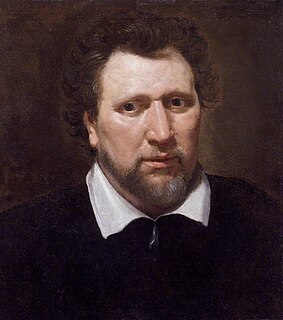Related Research Articles

Benjamin Jonson was an English playwright and poet, whose artistry exerted a lasting impact upon English poetry and stage comedy. He popularised the comedy of humours. He is best known for the satirical plays Every Man in His Humour (1598), Volpone, or The Fox, The Alchemist (1610) and Bartholomew Fair (1614) and for his lyric and epigrammatic poetry. "He is generally regarded as the second most important English dramatist, after William Shakespeare, during the reign of James I."

The cavalier poets was a school of English poets of the 17th century, that came from the classes that supported King Charles I during the English Civil War (1642–1651). Charles, a connoisseur of the fine arts, supported poets who created the art he craved. These poets in turn grouped themselves with the King and his service, thus becoming Cavalier Poets.

This article focuses on poetry from the United Kingdom written in the English language. The article does not cover poetry from other countries where the English language is spoken, including Southern Ireland after December 1922.

Sir William Davenant, also spelled D'Avenant, was an English poet and playwright. Along with Thomas Killigrew, Davenant was one of the rare figures in English Renaissance theatre whose career spanned both the Caroline and Restoration eras and who was active both before and after the English Civil War and during the Interregnum.

Robert Herrick was a 17th-century English lyric poet and cleric. He is best known for Hesperides, a book of poems. This includes the carpe diem poem "To the Virgins, to Make Much of Time", with the first line "Gather ye rosebuds while ye may".

Thomas Carew was an English poet, among the 'Cavalier' group of Caroline poets.

George Chapman was an English dramatist, translator and poet. He was a classical scholar whose work shows the influence of Stoicism. Chapman has been speculated to be the Rival Poet of Shakespeare's sonnets by William Minto, and as an anticipator of the metaphysical poets of the 17th century. Chapman is best remembered for his translations of Homer's Iliad and Odyssey, and the Homeric Batrachomyomachia.
Shackerley Marmion, also Shakerley, Shakerly, Schackerley, Marmyon, Marmyun, or Mermion, was an early 17th-century dramatist, often classed among the Sons of Ben, the followers of Ben Jonson who continued his style of comedy. He was also a friend and perhaps a protégé of Thomas Heywood.

Mary Herbert, Countess of Pembroke was one of the first English women to achieve a major reputation for her poetry and literary patronage. By the age of 39, she was listed with her brother Philip Sidney, Edmund Spenser and William Shakespeare as one of the notable authors of her time in the verse miscellany, Belvedere, by John Bodenham. The influence of her play Antonius is widely recognized; it stimulated a revived interest in the soliloquy based on classical models and was a likely source, among others, for both the closet drama Cleopatra (1594) by Samuel Daniel and Shakespeare's Antony and Cleopatra (1607). Sidney was also known for her translation of Petrarch's "Triumph of Death," from the poetry anthology Triumphs, but it is her lyric translation of the Psalms that has secured her poetic reputation.

Elizabethan literature refers to bodies of work produced during the reign of Queen Elizabeth I (1558–1603), and is one of the most splendid ages of English literature.

The Mermaid Tavern was a tavern on Cheapside in London during the Elizabethan era, located east of St. Paul's Cathedral on the corner of Friday Street and Bread Street. It was the site of the so-called "Fraternity of Sireniacal Gentlemen", a drinking club that met on the first Friday of every month that included some of the Elizabethan era's leading literary figures, among them Ben Jonson, John Donne, John Fletcher and Francis Beaumont, Thomas Coryat, John Selden, Robert Bruce Cotton, Richard Carew, Richard Martin, and William Strachey. A popular tradition has grown up that the group included William Shakespeare, although most scholars think that was improbable.
Thomas May was an English poet, dramatist and historian of the Renaissance era.

The Caroline or Carolean era refers to the era in English and Scottish history during the Stuart period (1603–1714) that coincided with the reign of Charles I (1625–1642), Carolus being Latin for Charles. The Caroline era followed the Jacobean era, the reign of Charles's father James I & VI (1603–1625); it was followed by the Wars of the three Kingdoms (1642–1651) and the English Interregnum (1651–1660).
The Damoiselle, or the New Ordinary is a Caroline era stage play, a comedy by Richard Brome that was first published in the 1653 Brome collection Five New Plays, issued by Humphrey Moseley, Richard Marriot, and Thomas Dring.
A Fine Companion is a Caroline era stage play, a comedy written by Shackerley Marmion that was first printed in 1633. It is one of only three surviving plays by Marmion.

Richard Martin (1570–1618) was an English lawyer, orator, and supporter of the Virginia Company who was appointed Recorder of the City of London at the recommendation of James I of England in 1618 but died shortly thereafter.
Nationality words link to articles with information on the nation's poetry or literature.
Nationality words link to articles with information on the nation's poetry or literature.
Nationality words link to articles with information on the nation's poetry or literature.
Clement Paman (d.1664) was an English poet and clergyman of the 17th century sometimes associated with the Cavalier Poets in the tradition of Ben Jonson and Thomas Carew. He was described in 1994 as "perhaps the most talented poet of the seventeenth century never to have had a poem published over his name."
References
- Davis, Joe Lee. The Sons of Ben: Jonsonian Comedy in Caroline England. Detroit, Wayne State University Press, 1967.
- MacLean, Hugh (ed.). Ben Jonson and the Cavalier Poets. New York, Norton, 1974.
| This poetry-related article is a stub. You can help Wikipedia by expanding it. |